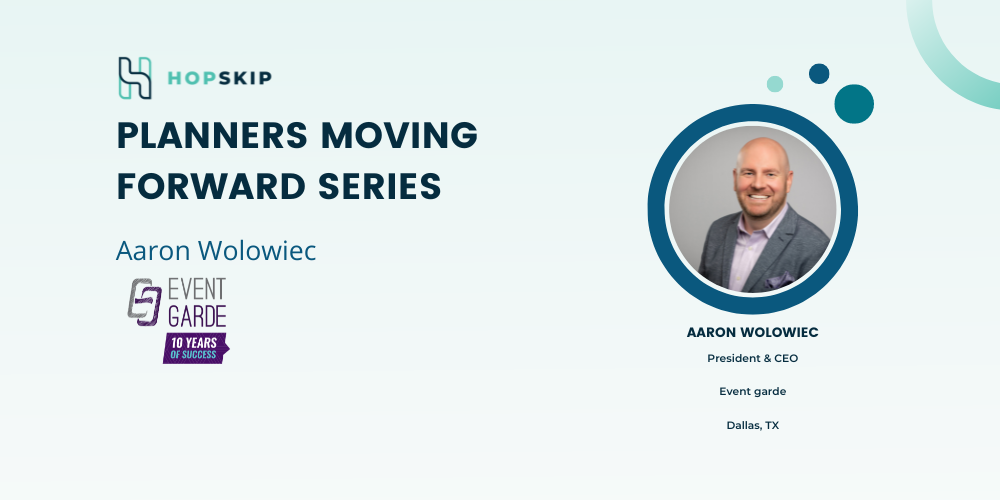This post is part of the HopSkip Planner Spotlight Series where HopSkip spotlight's planners across the industry to bring awareness of how they adapted to COVID-19, communicating and lessons learned and sharing how they are viewing the meetings and events industry in a post-pandemic world.
Name: Aaron Wolowiec
Company Name: Event Garde
Job Title: President & CEO
Years of Experience:
How do you think you are positioned, after months of persevering with the pandemic, to take advantage of our new and disrupted meetings/events landscape?
I think that associations have necessarily innovated to meet member/learner needs in spite of the pandemic. But as in-person events come back online, associations now have to decide what their comprehensive meeting/event portfolios will look like moving forward (e.g., which programs, in what formats, for what audiences). This will require some mix of maintenance, innovating, and sunsetting that is best explored through a series of intentionally designed and facilitator-led strategy discussions.
As our community moves forward with planning in-person meetings, what new technologies or processes are you implementing that you may have not looked at before?
I think we're pulling out all the stops when it comes to event marketing. After two years at home, many members/attendees are wondering if attending in-person is worth it. So we're utilizing more video testimonials, creating more customizable resources designed to help prospective attendees seek internal approval to register/attend, engaging members in peer-to-peer marketing, and exploring new ways to segment and uniquely message to our database.
As we see virtual meetings transition back to face to face, hybrid meetings are beginning to be the vehicle to return to normalcy. What are your thoughts on hybrid meetings versus traditional fully in-person meetings?
Hybrid meetings can be extraordinarily helpful to bridge the gap for those members/attendees who are uncomfortable or otherwise unable to attend in-person. But a hybrid meeting, done well, is more like planning and implementing three separate meetings: the virtual meeting, the in-person meeting, and the meeting that bridges the two audiences. As a result, we should be clear up front as to our desired expectations, experience, and outcomes for each audience segment, along with the resources needed to bring it to life (e.g., staff, budget, time, and other resources) before committing to a meeting format.
In your opinion, what do you think the biggest value for your attendees is in regards to returning to live events?
The quality of the networking experiences we can deliver in-person, whether 1:1, small group, or large group.
As the pandemic fades away and we return to face-to-face events what do you hope changes, either for planners or hoteliers, in the traditional RFP and proposal process as a result of all of the learnings from the last 20+ months?
I hope that planners will be more flexible and innovative when it comes to imagining their events moving forward (less copy-and-paste year to year). Likewise, I hope hoteliers will be more collaborative and consultative as we work to create quality experiences for members/attendees despite the lingering effects of the pandemic, including inflation, supply-chain, and workforce challenges, among others.
This post is part of the HopSkip Planner Spotlight Series where HopSkip spotlight's planners across the industry to bring awareness of how they adapted to COVID-19, communicating and lessons learned and sharing how they are viewing the meetings and events industry in a post-pandemic world.
